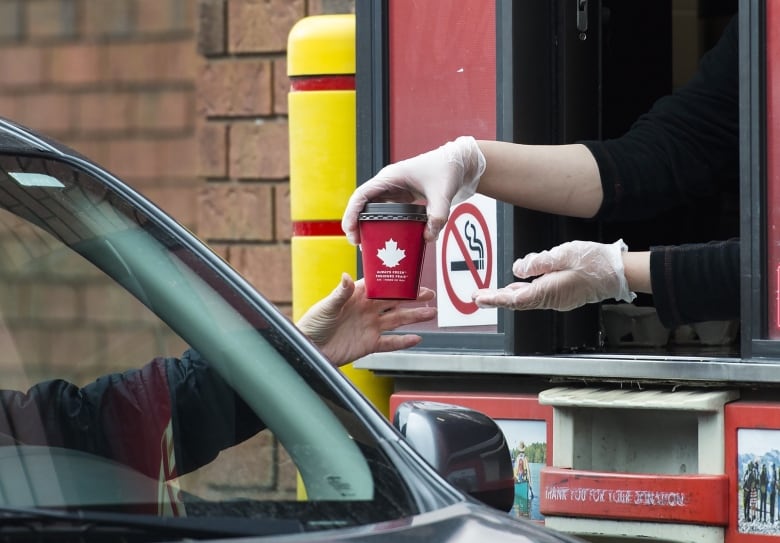There's never been a better time for teens to land a job. So why aren't as many applying?
Unemployment is at a record low, but teen participation in the labour market isn't what it used to be


It didn't take 14-year-old Addison Taylor long to find a part-time job.
"I first started thinking about getting a job probably two months or three months ago," said the Grade 9 student from Newmarket, Ont.
She'd been babysitting for about a year, but wanted steady hours and steady pay.
After carefully crafting her resume, Addison applied to three places, securing both a solid lead on a job at a tea shop that could start in the summer, and an offer to start right away as a host at a local Italian restaurant.
She chose the restaurant so could start sooner. Because she gets a cut of the tips, it also pays better.
"I didn't have a ton of money and I wanted to be able to go out with my friends and do stuff like that."

Teens who want a summer job this year will likely find it easier than ever to land one. While youth employment took a big hit when the pandemic started, it's rebounded completely now, along with most of the rest of the employment landscape.
The unemployment rate just hit a record low of 5.3 per cent and Canada had more than 915,000 vacant jobs in the fourth quarter of 2021, according to the most recent data available, close to the record hit in September 2021 when vacancies topped one million.
Those jobs cross all kinds of sectors, including some where teens are most likely to work — food service and retail, according to Statistics Canada labour market analyst Lahouaria Yssaad.
"The highest number of vacancies is in accommodation and food services," said Yssaad, followed by health care and social assistance, which don't employ many teens. "Third is the retail trade."
A survey of Canadian businesses released last week — conducted by Angus Reid on behalf of the workplace safety non-profit Threads of Life — found that 75 per cent of respondents either already have young workers on staff or plan to hire them in 2022.
"You could almost say anyone who wants to work, can work," Tim Lang, president and CEO of Ontario's Youth Employment Services, told CBC. He says that's a good thing because when kids get on the employment ladder, it helps both their families and the economy.
But because teens are less likely to pursue work than in the past, many of those opportunities will be left on the table.

Participation rate down
The labour participation rate — the percentage of those working or actively looking for work — among teens 15 to 19 has declined in recent decades.
Statistics Canada has been gathering this kind of data since 1976.
It says teen labour participation peaked in 1989 at just over 59 per cent. In 2008, it was also really solid at 56.5 per cent. But for years it has hovered right around 50 per cent, dipping when COVID first hit. The latest number based on the first few months of 2022 puts it at 50.7 per cent, says Yssaad.
That means if teens were as likely to work today as in 2008 there would be more than 100,000 additional workers, according to analysis of the data by Restaurants Canada, a non-profit association representing the food service industry, which has struggled with staffing shortages made particularly acute by the pandemic.

Too busy for work?
Howie Dayton — the director of community recreation with the City of Toronto's Parks, Forestry and Recreation Division — agrees that there's been a "noticeable change" in the availability of part-time teen workers.
"We compete with so many of the extracurricular activities and school pressures that we know young people face now," said Dayton, who's worked in community recreation for nearly 30 years.
"As a result, we need more people to fill the types of shifts that we could have filled with fewer people years ago because young people don't have as much availability to work as many hours as we might need them to."
That certainly applies to Addison's life.
"I play rep volleyball and basketball, and since that was my first commitment, I do have to take those as priorities," she said. "I have school. I have tutoring once a week … and of course, I like to hang out with my friends sometimes, too."
Still, once she was hired, Addison was able to negotiate a schedule with the restaurant to work Tuesday and Thursday evenings only, when she doesn't have practice or tournaments.
A paycheque, plus perks
Employers that hire a lot of teens say they're competing to recruit young workers.
Cineplex offers perks like free movies and gaming, says Allison Dell, the theatre chain's head of human resources.
It employs about 9,000 part-time staff in Canada and the U.S., around 80 per cent of them between the ages of 15 to 25, to do a range of jobs from scooping popcorn at the concession to operating games at their Rec Room and Playdium entertainment venues.
"Cineplex has a long history of being a wonderful first-time employer," she said, adding that the pay is competitive and that the company puts a lot of focus on having a good employee culture.
Toronto's Parks and Rec department holds workshops for prospective staff on things like resume writing and employment readiness. If the costs of the required certifications in things like first aid are a barrier, there is funding available to cover those, said Dayton. It also holds both in-person and virtual job fairs, he said.
Centreville Amusement Park, which runs every summer on Toronto Island, even hosts a semi-formal so its 400 young seasonal staffers can celebrate with their work friends.
Christine Blue got her first job at Centreville when she was 16, and today she's its head of human resources.
She recommends that applicants prepare a resume, even if they don't have much to put on it.
"If this is your first job, we're not going to expect you to have all these different places that you worked. You just need the basics," she said. "If you did a little bit of babysitting, put that on there. If you don't have anything, then just put your activities that you do, your extracurricular stuff that you are involved in; volunteer [work] is great to put on there and your name, your address, all that stuff."
When it's time for the interview, Blue says the key is for teens to do their best to overcome shyness and project enthusiasm.
"We want the applicant to be confident in answering the questions. You want to show that you're a problem solver … that you're capable and able to take on talking to the public."
Asked what advice she'd give to other teens who want to land a job, Addison says it comes down to just getting out there.
"I think you just need to reach out and take a risk and take that jump because you can procrastinate all you want, like sit at home, write your resume, think about where you want to go," she said.
"But eventually you're going to have to go out and eventually you're going to have to apply to some jobs. And it's really not as bad as it seems."

With files from Don Pittis

